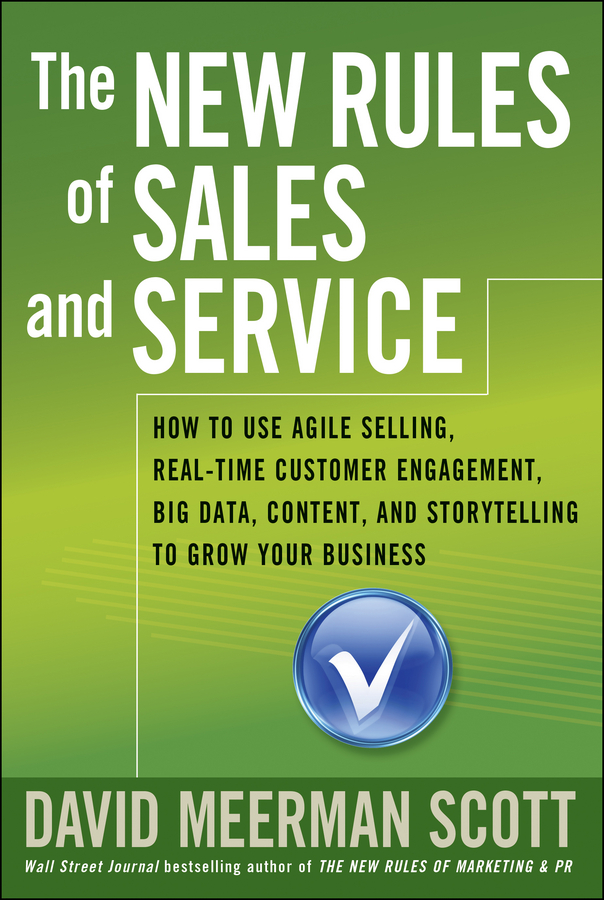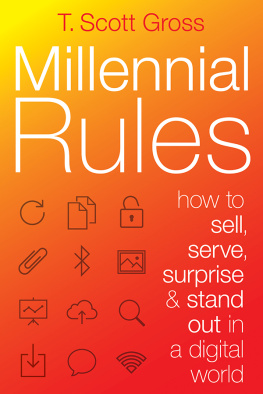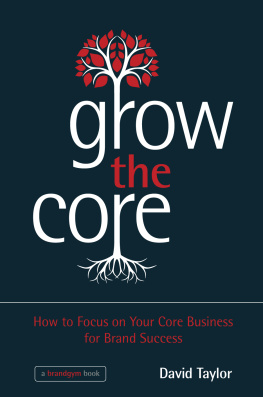
Also by David Meerman Scott
The New Rules of Marketing & PR: How to Use Social Media, Online Video, Mobile Applications, Blogs, News Releases, and Viral Marketing to Reach Buyers Directly
Marketing the Moon: The Selling of the Apollo Lunar Program (with Richard Jurek)
Real-Time Marketing & PR: How to Instantly Engage Your Market, Connect with Customers, and Create Products That Grow Your Business Now
Marketing Lessons from the Grateful Dead: What Every Business Can Learn from the Most Iconic Band in History (with Brian Halligan)
Newsjacking: How to Inject Your Ideas into a Breaking News Story and Generate Tons of Media Coverage
World Wide Rave: Creating Triggers That Get Millions of People to Spread Your Ideas and Share Your Stories
Tuned In: Uncover the Extraordinary Opportunities That Lead to Business Breakthroughs (with Craig Stull and Phil Myers)
Cashing In with Content: How Innovative Marketers Use Digital Information to Turn Browsers into Buyers
Eyeball Wars: A Novel of Dot-Com Intrigue
Cover image: iStock.com/Zeffss1
Cover design: Wiley
Copyright 2014 by David Meerman Scott. All rights reserved.
Published by John Wiley & Sons, Inc., Hoboken, New Jersey.
Published simultaneously in Canada.
No part of this publication may be reproduced, stored in a retrieval system, or transmitted in any form or by any means, electronic, mechanical, photocopying, recording, scanning, or otherwise, except as permitted under Section 107 or 108 of the 1976 United States Copyright Act, without either the prior written permission of the Publisher, or authorization through payment of the appropriate per-copy fee to the Copyright Clearance Center, 222 Rosewood Drive, Danvers, MA 01923, (978) 750-8400, fax (978) 646-8600, or on the web at www.copyright.com. Requests to the Publisher for permission should be addressed to the Permissions Department, John Wiley & Sons, Inc., 111 River Street, Hoboken, NJ 07030, (201) 748-6011, fax (201) 748-6008, or online at www.wiley.com/go/permissions.
Limit of Liability/Disclaimer of Warranty: While the publisher and author have used their best efforts in preparing this book, they make no representations or warranties with respect to the accuracy or completeness of the contents of this book and specifically disclaim any implied warranties of merchantability or fitness for a particular purpose. No warranty may be created or extended by sales representatives or written sales materials. The advice and strategies contained herein may not be suitable for your situation. You should consult with a professional where appropriate. Neither the publisher nor the author shall be liable for damages arising herefrom.
For general information about our other products and services, please contact our Customer Care Department within the United States at (800) 762-2974, outside the United States at (317) 572-3993 or fax (317) 572-4002.
Wiley publishes in a variety of print and electronic formats and by print-on-demand. Some material included with standard print versions of this book may not be included in e-books or in print-on-demand. If this book refers to media such as a CD or DVD that is not included in the version you purchased, you may download this material at http://booksupport.wiley.com. For more information about Wiley products, visit www.wiley.com.
Library of Congress Cataloging-in-Publication Data:
Scott, David Meerman.
The new rules of sales and service : how to use agile selling, real-time customer engagement, big data, content, and storytelling to grow your business / David Meerman Scott.
pages cm
Includes bibliographical references and index.
ISBN 978-1-118-82785-7 ISBN 978-1-118-93910-9 (ebk); ISBN 978-1-118-93911-6 (ebk) 1. Selling. 2. Customer service. 3. Internet marketing. 4. Big data. I. Title.
HF5438.25.S347 2014
658.8--dc23
2014022280
Dedication
This book, my 10th, is dedicated to my grandmother Dorothy Miller Jones (19051996). When I was a child, Grandma Jones taught me that if you want to receive letters, you've got to write letters. I wish I could share with her that the same thing is true today about social networking and customer engagement; you have to give to get.
Introduction
Are you old enough to remember when travel agents were an essential part of your life? To book a vacation you had to go to a travel agent. There was no other choice. Every town had at least one, and in the big cities travel agencies were on every corner.
First, before you set foot in the travel agency, you might do a little research about the sort of vacation you had in mind. Warm weather at a beach? Or perhaps a week of skiing? Maybe a cruise? Did you want to go somewhere exotic and far away? Or nearby within driving distance?
Doing the research was really, really difficult.
You would ask friends for recommendations, but they knew only so much. You could read a travel magazine, but with only a limited number of pages in each issue, it was hardly comprehensive. Guidebooks helped, but because of the book publication cycles, they were inevitably dated. If you wanted to compare different destinations, you needed more than one guidebook. And by definition, a book is just one person's opinionthe author's. No matter how much research you did, it was never enough to get a total picture of a potential holiday location.
Sooner or later you had to go into that travel agency, and that's when you surrendered control of the already imperfect process: You had to put yourself at the mercy of a salesperson. As she sat behind a terminal, she tossed out destination options, quoted prices for flights and rental cars, and suggested hotels. Perhaps she loaded you up with a bunch of brochures to look through.
The best travel agents were adept at matching destinations, experiences, and properties to a traveler's needs. They built a loyal following and made a good living via repeat business and word-of-mouth referrals.
But too often, agents weren't very good and just sold what was most convenient. They would steer clients to the easy sale in Florida instead of the more complicated booking at a small resort on an obscure island in the French-speaking part of the Caribbean. Worse, unscrupulous agents would sell crappy cruises simply because they earned additional commissions from low-end operators desperate to fill their ships.
The bottom line in booking a vacation 20 years ago was simple: The travel agent was in charge of the sales process because she had the information. The unfortunate traveler was limited to her recommendations and her prices.
And it wasn't just travel. This was the case for nearly every sales situation one transacted.
It's a new world now. The way we book travel today is so utterly different from being tied to agents as to be unrecognizable.
In December 2013 my wife and I went on a 10-day expedition to Antarctica. Since I was a kid I'd dreamed of seeing giant blue-green icebergs up close and encountering penguins and whales in the most remote continent on earth.
We began our independent research on the web more than a year before to our expedition.
We used Google to find the results for such phrases as Antarctica travel, Antarctica expedition, and visit Antarctica. Our searches led us to about a dozen expedition outfitters, and we carefully checked out each of them via their sites. We also found personal blogs written by people who had undertaken such an expedition. These offered great information about what we needed to consider. There were independent reviews of operators and expedition ships. We found articles profiling Antarctica travel on newspaper and magazine websites. We even landed on the site of the International Association of Antarctica Tour Operators, and while it is a trade organization, we learned a lot more there.
Next page




